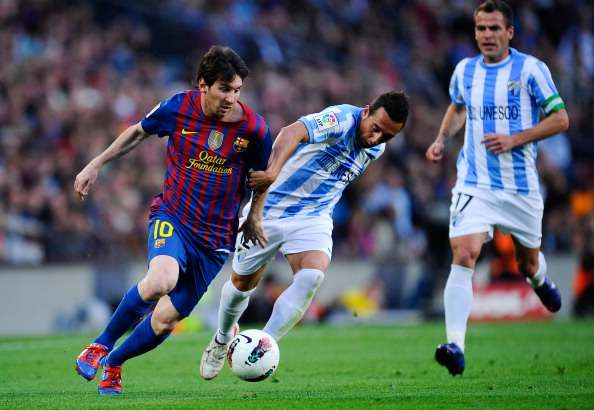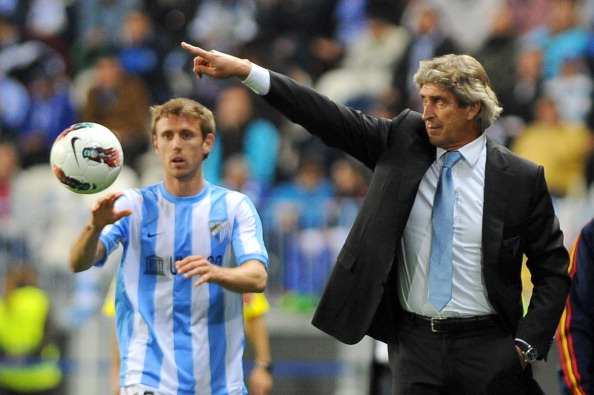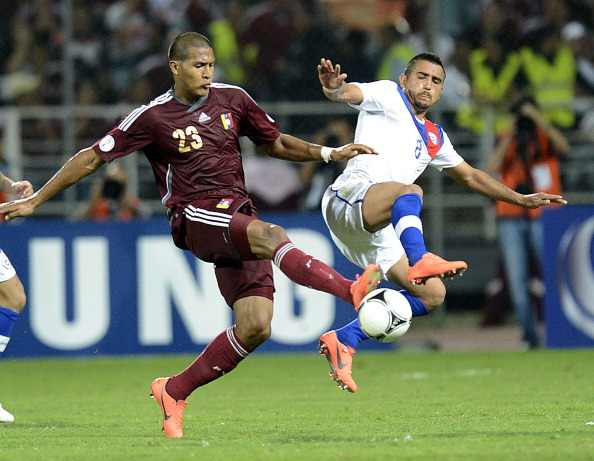Financial uncertainty is hindering the pre-season preparations of La Liga outfit Málaga. Despite being bankrolled by its wealthy Qatari owner, players’ wages have, reportedly, not been paid.
The club is also on the brink of losing its best player, the Spain international Santi Cazorla (pictured below, centre), to Premier League side Arsenal. A number of Spanish newspapers have also reported that Málaga’s owner Sheikh Abdullah Bin Nassar Al-Thani is looking to sell the club. In theory, Málaga are the richest team in Spain, but they are enduring misery at the start of what should be their greatest adventure yet – a run in the Champions League.
Since Al-Thani’s takeover in June 2010, they have spent significant sums buying in players like Ruud van Nistelrooy, Júlio Baptista, and last year beating Arsenal to sign Cazorla from Villarreal.
Málaga have released a statement saying they are “restructuring” their finances in response to the demands of UEFA’s financial fair play regulation, which requires clubs to balance their books in the long term and prevents them spending more they earn in the pursuit of success.
During the last year, there have been concerns about the club’s financial position. A dispute with Club Atlético Osasuna in January saw Málaga issued with a transfer ban as a result of the debt owed to Osasuna when buying Nacho Monreal from them.

Now, amid reports that wages have not been paid, the club’s manager Manuel Pellegrini (pictured below, right) has spoken of his frustration with the situation.
“We are focused on the sporting side of things but when there are so many rumours it has to have an effect, also being away from Spain,” he said during the club’s tour of Venezuela this week.
“But we are calm because we have been working very well. We’ll see when we get back to Spain, see which rumours are true and which are not. Until there is a certain clarity about what is going on it’s not good to express opinions. We’ll be back in Spain on Tuesday and we’ll see what we find there.”
Adding further to the problems has been the announcement that Jérémy Toulalan, another player signed only last year, plans to leave Málaga. “We have confirmation that Malaga cannot continue with its fantastic project,” his agent Michael Manuello said.

“To save itself, the club must sell players, and it looks like Jérémy is one of them.”
As is 22-year-old Salomón Rondón (pictured below, left), their top scorer last year, who is possibly also on his way to London, with Tottenham Hotspur reportedly interested in him.
The developments at La Rosaleda suggest that UEFA and President Michel Platani’s financial fair play rule have impacted on its mega-rich owner, preventing him spending money that the club may not have.
Premier League team Manchester City seem to be taking similar notice and have not spent a penny since posting losses of £197 million ($311 million/€230 million) in their last accounts following a huge outlay last summer.

Now they are unwilling to sign Arsenal’s Robin van Persie, and are offloading an expensive array of strikers, including Emmanuel Adebayor, Roque Santa Cruz and Edin Džeko.
In London, however, Chelsea continues to spend significantly, despite posting weighty yearly losses. The signings of Eden Hazard, Marko Marin and Oscar signal Roman Abramovich’s intent not to let UEFA constrain him too much – although it is true that the bulk of Chelsea’s spending can be attributed to the prize money they received for winning the Champions League.
The most difficult battle Platini may have is with the Qatari owner at Paris St-Germain. The biggest spenders in Europe, they have spent enormous sums in the last two years. This summer, they bought Ezequiel Lavezzi, Zlatan Ibrahimović and Thiago Silva. How they intend to meet the demands of financial fair play is unclear. Perhaps they have a confident set of accountants.
Whatever happens, the situation at Málaga is a victory of sorts for UEFA, as is the slow down in spending at Manchester City. If UEFA’s aim was to stop mega-rich owners from investing in clubs and spending beyond their teams’ means, they have made a good start. But there is still a long, long way to go in this particular battle.
David Gold is a reporter for insideworldfootball. To follow him on Twitter click here.

